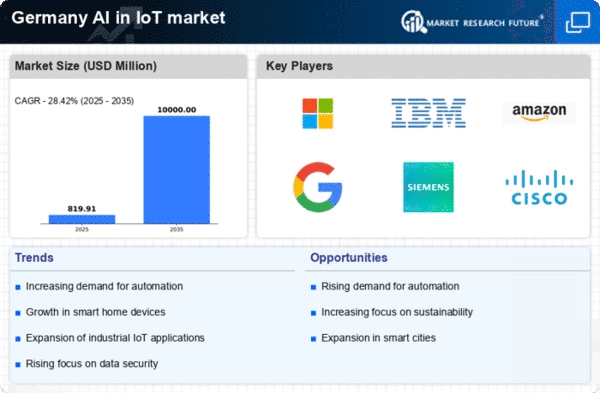Growing Focus on Industry 4.0
The transition towards Industry 4.0 is a significant driver for the ai in-iot market in Germany. This paradigm shift emphasizes the integration of digital technologies into manufacturing processes, enhancing efficiency and productivity. The adoption of AI and IoT solutions is essential for achieving the goals of Industry 4.0, such as real-time data analysis and automation. As German manufacturers increasingly embrace these technologies, the ai in-iot market is expected to expand rapidly. Industry reports suggest that the market could reach €30 billion by 2027, reflecting the strong alignment between Industry 4.0 initiatives and the growth of the ai in-iot market.
Government Support and Funding
Government support plays a crucial role in the development of the ai in-iot market in Germany. Various funding programs and initiatives are being implemented to encourage research and development in AI and IoT technologies. The German government has allocated approximately €1 billion for digital innovation projects, which includes the integration of AI in IoT applications. This financial backing not only stimulates innovation but also attracts private investments, creating a conducive environment for the growth of the ai in-iot market. The collaboration between public and private sectors is likely to enhance the technological landscape in Germany.
Advancements in AI Technologies
Technological advancements in AI are significantly impacting the ai in-iot market in Germany. Innovations in machine learning, natural language processing, and computer vision are enabling more sophisticated IoT applications. These advancements allow for improved data analytics, predictive maintenance, and automation across various sectors, including manufacturing and healthcare. The market for AI in IoT is expected to grow at a CAGR of 25% from 2025 to 2030, indicating a robust future for the ai in-iot market. Companies are increasingly investing in AI capabilities to enhance their IoT solutions, thereby driving market growth.
Rising Demand for Smart Infrastructure
The ai in-iot market in Germany is experiencing a notable surge in demand for smart infrastructure solutions. This trend is driven by the increasing need for efficient energy management and resource optimization in urban areas. As cities evolve into smart cities, the integration of AI with IoT technologies becomes essential for managing traffic, utilities, and public services. Reports indicate that investments in smart infrastructure are projected to reach €50 billion by 2026, highlighting the potential for growth in the ai in-iot market. The German government is actively promoting initiatives to enhance urban living through technology, which further fuels this demand.
Increased Consumer Awareness and Adoption
Consumer awareness regarding the benefits of AI and IoT technologies is rising in Germany, which is positively influencing the ai in-iot market. As individuals become more informed about smart home devices, wearable technology, and connected appliances, the demand for these products is increasing. This trend is further supported by the growing emphasis on convenience, security, and energy efficiency among consumers. Market analysts predict that the consumer segment of the ai in-iot market could grow by 40% over the next five years, indicating a robust potential for expansion. The increasing adoption of smart technologies is likely to drive innovation and competition within the market.

















